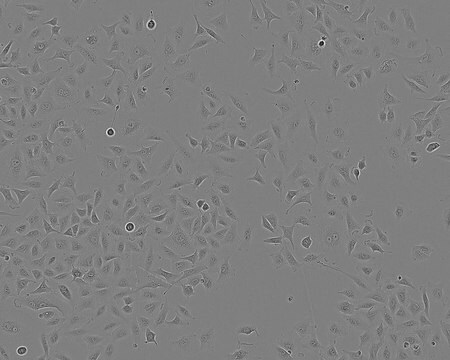Recommended Products
product name
DMS 53, 95062823
biological source
human lung
growth mode
Adherent
karyotype
Modal no. 60
morphology
Epithelial
products
Variety of hormones, high level of calcitonin
receptors
Bombesin (BN), Epidermal growth factor (EGF), Transforming growth factor (TGF-beta), acetylcholine receptor (AChR)
technique(s)
cell culture | mammalian: suitable
relevant disease(s)
cancer
shipped in
dry ice
storage temp.
−196°C
Cell Line Origin
Human Caucasian lung small cell carcinoma
Cell Line Description
DMS 53 is a small cell carcinoma of the lung (SCLC) isolated in 1974 from a mediastinal biopsy at time of diagnosis from a 54 year-old male patient prior to treatment. DMS 53 secrete a large variety of hormones including adrenocorticotropin (ACTH), bombesin (BN), calcitonin (CT), chorionic gonadotrophin (hCG), glucagon, growth hormone (GH), oxytocin-neurophysin (OT-NP), parathyroid hormone (PTH), somatostatin-like immunoreactivity (SRIF), thyroid releasing hormone (TRH) and 17β-estradiol. Expression of cell surface antigens Leu-7, Class I HLA, CLASS II HLA and My23 (defined by AML-2-23 monoclonal antibody) has been shown. DMS 53 cells produce receptors for BN, epidermal growth factor (EGF), transforming growth factor-β (TGF β) and acetylcholine (AChR). This cell line was shown to be tumourigenic in nude, athymic mice.
Application
Human lung tumour model
DNA Profile
STR-PCR Data: Amelogenin: X
CSF1PO: 12
D13S317: 10
D16S539: 12,13
D5S818: 10,11
D7S820: 8,11
THO1: 8,9.3
TPOX: 12
vWA: 15,17
CSF1PO: 12
D13S317: 10
D16S539: 12,13
D5S818: 10,11
D7S820: 8,11
THO1: 8,9.3
TPOX: 12
vWA: 15,17
Culture Medium
Waymouth′s MB 752/1 + 2mM Glutamine + 10% Foetal Bovine Serum (FBS) (Heat Inactivated).
Subculture Routine
Split sub-confluent cultures (70-80%) 1:4 i.e. seeding at 4x10,000 cells/cm2 using 0.25% trypsin or trypsin/EDTA; 5% CO2; 37°C.
Other Notes
Additional freight & handling charges may be applicable for Asia-Pacific shipments. Please check with your local Customer Service representative for more information.
Certificates of Analysis (COA)
Search for Certificates of Analysis (COA) by entering the products Lot/Batch Number. Lot and Batch Numbers can be found on a product’s label following the words ‘Lot’ or ‘Batch’.
Already Own This Product?
Find documentation for the products that you have recently purchased in the Document Library.
Our team of scientists has experience in all areas of research including Life Science, Material Science, Chemical Synthesis, Chromatography, Analytical and many others.
Contact Technical Service

